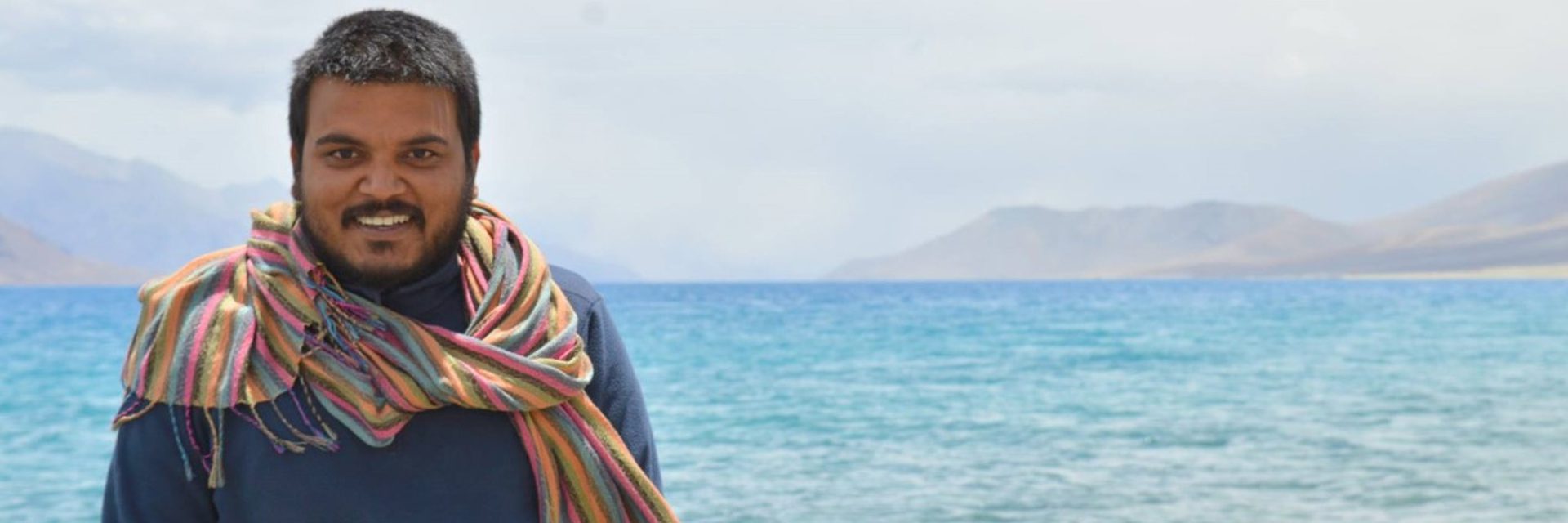(April 1, 2022) The year was 2009. The audience at the Miranda House in Delhi gave the performers a thunderous applause. Pankaj Tiwari won the best actor award that night. In that moment he decided that he would never leave theatre. Today a theatre-maker and curator in Amsterdam, Pankaj still tackles each performance as if it is his first. His studio in Amsterdam is a hub for eclectic artsy oeuvres, discussions, and his collaborative 356 km walk during the pandemic to spread awareness on India’s migrant crisis have all added to his acclaim as an artist. Through the initiative, The Art of Walking they collected over €20,000, which were used to support over 100 migrant labour families in India for about three months.
“I never consciously decided to become an actor. But once I started performing, I knew I couldn’t stop,” shares a smiling Pankaj, in an interview with Global Indian. “For me, art is the farming land where we seed a new future. We have to build trust with the audience. Building new communities is my primary practice,” adds the international thespian.

Pankaj Tiwari
Making of an actor
Growing up in the small town of Balrampur in Uttar Pradesh, Pankaj always was a happy-go-lucky child. His father, who worked at the UP forest department, often stayed away on duty so his mother was a constant. “Even though my father didn’t earn much, she was an efficient homemaker. I have two brothers. We saw my parents work hard so that we could have a good education. So, I have to do well in life for them,” says the international thespian.
While he didn’t take part in many extracurriculars at school, it was a scouts and guides campfire night that awakened the actor in him. “We were asked to put up a play, and the group was short of an actor. It was a very small part, but I agreed to do it. That night many people appreciated me, and I found that experience exciting,” he recalls.

Pankaj with his family
After school, he dropped a year to prepare for IIT, but life had other plans. A five-digit rank at the AIEEE exam right after school, after one year of preparation, pushed his ranks into lakhs. “I couldn’t understand what went wrong,” laughs Pankaj, “But thankfully a friend had filled my Delhi University admission form, and I made it to the cut-off list.”
Married to theatre
A student of physical science at the Deen Dayal Upadhyaya College in DU, Pankaj participated in several plays in college, and inter-college competitions. After college, he started working on plays with the Breakthrough Trust, an NGO working on the issue of domestic violence, and met several like-minded thespians and activists.
The years between 2010 and 2018 saw him work as a theatre facilitator, consultant, and educator with several institutes and organisations – Ambedkar University, IIT Gandhinagar, Pearl Academy Delhi, Kranti Mumbai, and Disha India. Soon, he was in several critically acclaimed plays – Carnival: the Fest of Bodies (2013-17), 30 days in September (2011-16), Laal Batti Express (2014-18), The 7Inch State (2016), They do not move (2017), and The souvenir (2018).

Pankaj during Amsterdam’s DAS Theatre’s Winter Presentations
The quest to learn saw him study three master’s courses – at Azim Premji University, Bengaluru (MA in education), Indian Institute of Technology, Gandhinagar (MA in society and culture), and DAS Theatre, Amsterdam (specialisation in curation).
“I never feel more at home than when I am on the stage. That’s why I tell people that I am married to the theatre,” laughs the international thespian, adding, “When I got invited to be part of 4TH IETM Croatia (2018), I met many people who loved theatre the way I did. I then decided to move to Amsterdam.”
A new beginning
While work in Amsterdam was exciting, and he was being invited to various national and international art residencies and festivals across Europe as a curator or jury member, finding a place to live in the city was a nightmare. “Fortunately, I had a few friends who let me bunk on their couches,” he recalls, helpless, and annoyed. So, he decided to return to India. “I wrote a poem about the harsh treatment of immigrants in the city and left the country. On the third day of my return to Delhi, my friends called to tell me that someone was ready to rent me their flat,” he shares.
Thus began a new chapter in Pankaj’s life. In January 2020, Pankaj initiated Current: a Space, Amsterdam, a studio within walking distance of the world-famous Anne Frank House. Interestingly, he uses theatre, food, and farming as a medium for community building. “Actually, cooking has been my hobby. Whenever I feel stressed, I cook. Many friends come for lunch or dinner. I used these meetings as a community-building exercise. Every second weekend about 30-40 people drop in. We discuss everything from art to politics and current issues,” the international thespian says.

Pankaj during a theatre session
During the pandemic, when India witnessed lakhs of migrant workers walking miles to reach home, Pankaj along with Abhishek Thapar walked 356 km from Amsterdam to Calais, in France, to spread awareness in Europe about the abysmal condition of migrant labourers in India.
Currently his collaborative project – The Listeners – sees him along with Polish artist Maria Magdalena Kozlowska sit blindfolded in a hall, and listen to anyone who wants to vent their emotions. “I feel that my art has found new life. We do several such projects that are not just mere performances, but involve a community and create dialogue,” shares the international thespian.
Connected to his roots
He misses home and speaks to his parents every day. “It was difficult for them to understand what I was doing. But they never left my side. My father always told me to do what I wanted, and never have regrets,” he says.
Gearing up to host them in Amsterdam soon, he gushes, “My parents haven’t been on an airplane. So, I am very excited to show them the city and my work.”



charan sprash bhai yek jimedaar nagrik our muskilo me jo uth khda ho wahi mahan ho jata hai yek badi phal our achha pridam aap ko pura Bharat hamesa yek aadarsh ke rup; me dekhega